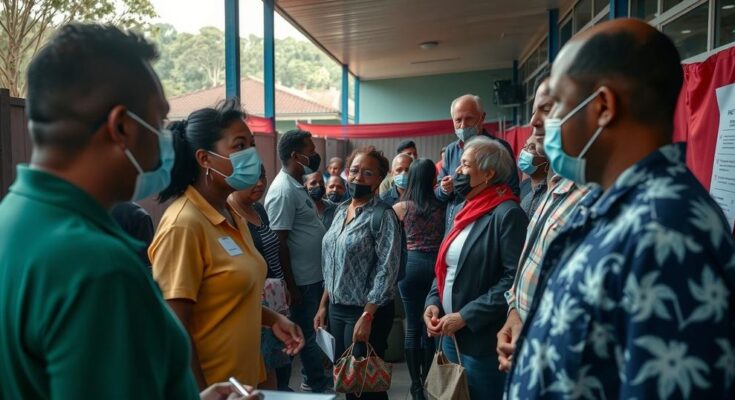Mauritius held a parliamentary election amid the fallout from a phone-tapping scandal that raised concerns over civil liberties and governance. Incumbent Prime Minister Pravind Jugnauth sought re-election following a significant sovereignty transfer deal from Britain regarding the Chagos Islands. The vote, marked by a 70 percent turnout, underscored critical issues of economic stability and political accountability against a backdrop of rising public discontent.
Mauritius conducted a parliamentary election amid allegations of a phone-tapping scandal that has clouded the political landscape. This election, deemed crucial for the continuity of economic and political stability, followed a significant agreement in which Britain transferred sovereignty over the Chagos Islands to Mauritius. Prime Minister Pravind Jugnauth’s re-election campaign, originally buoyed by this diplomatic success, faced stumbling blocks with leaked private conversations raising serious concerns about governance and civil rights in the country. The authorities responded by imposing a social media ban, which faced significant backlash, thus highlighting deteriorating public trust in democratic processes. The contest for the 70-seat National Assembly featured two prominent factions: Jugnauth’s Militant Socialist Movement and the Alliance of Change spearheaded by former Prime Minister Navin Ramgoolam. Both parties conveyed optimism about their chances while addressing issues, such as poverty alleviation and reducing living costs, that resonate with voters. Preliminary turnout reports indicated a participation rate of 70 percent at the closing of polls, with voters anticipating results the following day. Security was heightened at polling stations, and international observers monitored the election proceedings. Despite concerns voiced by Ramgoolam regarding potential electoral fraud, he later confirmed that voting took place smoothly. With a registered electorate of just over one million, this election marked the twelfth since Mauritius attained independence in 1968, underscoring the importance of democratic engagement for the nation’s future. Economic stability remains a primary concern for many Mauritians, particularly given the nation’s notable GDP growth of seven percent in 2023. Analysts have warned, however, that economic diversification is critical, amid rising fears of corruption and political maneuvering that has eroded institutional integrity. Democracy researcher Roukaya Kasenally remarked on the increased corruption during recent years, calling attention to procurement scandals and the suppression of political dissent. Mauritius’s leadership has been characterized by a cycle of familial succession since independence, with Jugnauth succeeding his father and Ramgoolam also hailing from the lineage of the first prime minister. The Linion Reform alliance emerged as a challenge to this status quo, advocating against perceived nepotism and corruption under the banner “Neither Navin, Nor Pravind.” The recent Chagos agreement, while a diplomatic milestone for Jugnauth, has raised questions regarding its potential impacts amidst geopolitical dynamics, particularly with the evolving stance of the United States in the region.
Mauritius is renowned as one of Africa’s most stable democracies, enjoying significant economic growth since gaining independence in 1968. The islands’ political history involves transitions among a few prominent families, which has often led to debates over governance and representation. The recent political tension arose from the phone-tapping scandal, which disturbed public confidence in government integrity. The Chagos Islands’ sovereignty agreement with Britain marked a key diplomatic success for Mauritius, but the reaction from differing political factions suggests an ongoing struggle over power and accountability, as the nation navigates its future direction amidst growing concerns over governance and civil rights.
In conclusion, the parliamentary election in Mauritius represents a critical juncture for the nation’s governance and civil liberties. Amid a backdrop of a significant diplomatic achievement and a controversial phone-tapping scandal, Mauritian voters are faced with fundamental decisions about their political representation and economic future. As the results are anticipated, the overarching question remains whether the electoral outcomes will enhance the nation’s democratic integrity or exacerbate existing challenges.
Original Source: www.guampdn.com




